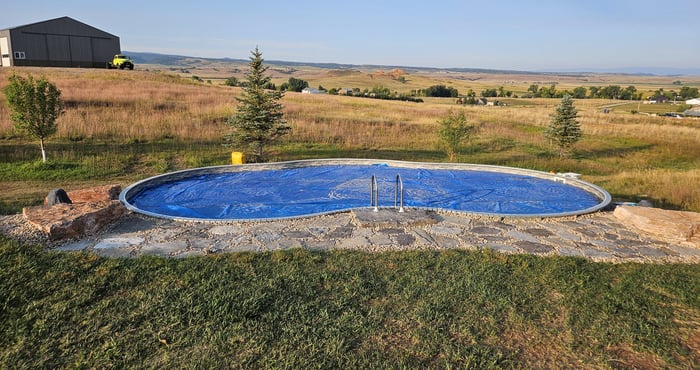For many, a natural gas or propane-fueled pool heater is an absolute necessity. Not only does adding a heater to your pool ensure you'll have a warm, comfortable pool to hop in every time you're ready to take a swim, but a heater can also drastically extend your swimming season. But different size pools hold different amounts of water ... and that means they require different size heaters to both raise the water temperature and hold it steady.
Of course, there are two main ways you as as pool owner may choose to use a pool heater. One of these is to let the pool cool down when not in use, then turn on the heater in advance of any swim to bring the temperature back up to where you'd like it. The other option is to run the heater constantly, using it to hold the water at a desired temperature so your pool is ready for a swim at any time.
A pool heater is well-suited for either of these uses, though if you are planning on letting the pool cool down between uses you may want to choose a higher-powered heater, as they will heat the water more quickly. This way you will not have to wait as long between deciding to swim and actually getting into the pool.
Determining the exact size heater you'll need for your pool comes down to a variety of different variables, including the size of the pool, starting temperature, air temperature, desired water temperature, and how quickly you want it to heat. By taking these various factors into consideration, you'll choose the right size heater for your pool and needs.
The heater size should be based on how warm you want the pool or spa water and how fast you want the pool to warm up. If you plan to keep the pool warm all the time a smaller heater will work. The most economical use is to oversize the heater and quickly warm up the pool water before you are ready to use it.
That said, there are some basic guidelines that we can recommend for you. Please note these are for gas-fueled pool heaters, not heat pumps.
Recommended Gas-Fueled Pool Heater Size Based on Pool Size
As a general guideline, the following gas heater sizes should be sufficient for the following pool sizes. As mentioned previously, however, when in doubt upgrade to pool heater one size larger than what is recommended.
| Pool Size: | Recommended Heater Size: |
| 16' x 32' | 250,000 BTU |
| 18' x 36' | 325,000 BTU |
| 20' x 40' | 400,000 BTU |
A heater that is under-powered for your pool will have a hard time heating your water and keeping the water at a constant temperature. An overpowered heater may raise the temperature too high, risking injury to you as well as damaging your pool.
Advanced: Degree Rise Expectations Based on Pool Size and Heater Size
For a more specialized recommendation in a pool heater, you can use the following chart to determine the proper heater size for your pool.
Use the following formula to get started:
- Determine what temperature you'd like the pool water to be.
- Subtract the average spring and fall air temperature for the period you will use the heater.
- This number is your desired temperature rise.
- Use the chart below to match the needed rise with the degree per hour rise in temperature for heater size.
Example:
- Desired temperature of 78 degrees
- Average spring and fall outside air temperature of 58 degrees.
- Temperature rise needed = 20 degrees.
Total Degree Rise Expected:
| Size (BTU) | 12' x 24' | 14' x 28' | 16' x 32' | 18' x 36' | 20' x 40' |
| 200,000 | 40 | 35 | 30 | 25 | 15 |
| 250,000 | 45 | 40 | 35 | 30 | 25 |
| 325,000 | overpowered | 45 | 40 | 35 | 30 |
| 400,000 | overpowered | overpowered | 45 | 40 | 35 |
Degree Rise Expected PER HOUR:
| Size (BTU) | 12' x 24' | 14' x 28' | 16' x 32' | 18' x 36' | 20' x 40' |
| 200,000 | 1.5 | 1.25 | 1 | .75 | underpowered |
| 250,000 | 2 | 1.75 | 1.5 | 1.25 | .75 |
| 325,000 | 3 | 2 | 2 | 1.5 | 1 |
| 400,000 | 3.5 | 2.75 | 2.5 | 1.75 | 1.25 |
Bonus Tip: Improve Heater Efficiency with a Cover
Raising your pool water temperature is just the start to having a consistently warm swimming pool. Keeping that water warm is another - and the best way to do that is to minimize any factors that encourage cooling of the water. The biggest cause for water temperature drops is evaporation and contact with cooler air.
By adding a cover to your swimming pool (ideally an automatic cover that's easy to open and close) you're adding an extra layer of insulation, which holds the heat in the water. Not only will this reduce the amount of work your pool heater must do to keep the water temperature constant, but it will also hold the temperature much better if you choose to only heat the water when you're ready to go for a swim.
Just as a clean and clear pool is important in having a pool you and your family can enjoy, so is having water that's at a comfortable temperature. Adding a heater to your pool is the best way to ensure this.
By choosing a heater that's the right size for your pool, warm water can be available any time you feel like taking a dip.





.jpg?width=700&name=Royal%20Swimming%20Pools%20INstallatin%20Team%20(9).jpg)
